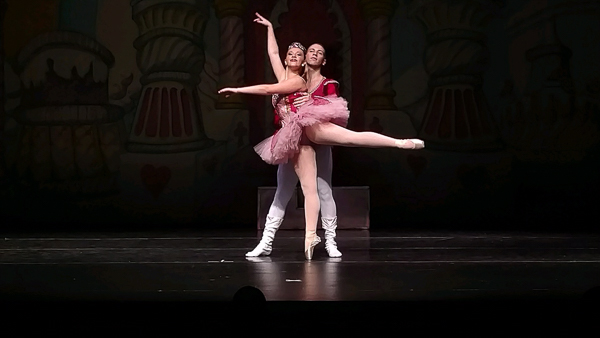By Meoghan Swain
I never lie when I say ballet is a part of who I am. How could it not be? It’s what I did before I knew how to tie my shoes. But I don’t think people always know what I mean by that.
They hear “ballet” and think of toddlers twirling around in tutus, but it’s so much more than that. As you learn ballet technique, tailbone down, abs engaged, thumbs tucked in, you also learn valuable life skills. It’s a part of the art.
I’m incredibly disciplined because without that skill I would have never learned to control my movements. It is better to try things and fall (literally) because without doing this I would never have learned balance.
But something ballet also taught me, that I maybe wished it hadn’t, was to be intensely self-critical.
Ballet is an incredibly technical art form by nature. The position of the body must be exact in order to adequately perform certain moves. For instance, if the core is not engaged and the arms are not level, a series of turns will not work as well because they lack the proper aerodynamics. Additionally, ballet requires the use of every part of the body, from one’s head to their toes, at all times. As a result, dancers, like me, learn to hyper-analyze themselves to make sure nothing is out of place. And if something is out of place, it becomes our priority to fix it.
Growing up with this mentality helped me succeed as a dancer. It helped me grow. Learning to catch onto even my smallest technical flaws put me closer to “perfection.” It also gave me a drive as there was always something I could improve on.
I would catch these flaws by finding as many outlets to visually critique myself as possible. I stared at myself in the mirror for hours on end, critiquing every part of my body. I took videos of myself dancing and picked apart what I did well and what I did horribly wrong. I was accustomed to being hard on myself because it’s what made me a better and stronger dancer.
I competed only with myself. Dance never taught me how to compete with other people. It wasn’t like field hockey or softball where you would try to outplay someone on the field. It was an internal competition, one where you would try to be better than you were the day before. If anything, I would see what other dancers did well and try to apply those skills to myself.
But I never had the mentality that I was trying to be better than anyone else. My director always told me, “The best dancers are humble,” and that always stuck with me. Practicing humility and having this mindset did make me a better dancer, but it also added another level to being my own worst critic. I never allowed myself to admit that I was a good dancer.
It wasn’t until I stepped away from ballet that I realized my self-critiquing habits negatively impacted my mental health and anxiety. Where in ballet self-criticism helped me flourish, it didn’t translate the same way in real life. It took me a while to see what I was doing, but because I was no longer able to hyper-analyze my bad habits as a dancer, I started to dwell on everything I didn’t like about myself as a person. I’ve always demanded a lot from myself and have strived to be the best person I could be. However, after ending my dance career, I really started to beat myself down.
I would try to perfect myself in everyday life just as I would in ballet. I couldn’t get rid of the idea that there is a “right way” to do things. When I wasn’t living up to my standards, getting schoolwork done, or keeping my body active I would think of myself so negatively. I got to a point where I could identify every imperfect thing about myself or every bad habit that I had and demanded I try to fix it.
The “fixing,” however, would never happen as my self-criticism made me spiral deeper and deeper into a state of anxiety and depression. Unlike in ballet, my self-analysis and criticism were not helping me grow. They were making me lose my sense of self at an age when I should’ve been discovering who I was.
Since identifying where my self-critiquing habits stemmed from, I have been able to restrain the negative thoughts about myself and give myself a bit of a break. I’ve also come to feel less alone in my struggles after opening up to other dance friends about my issues with self-criticism.
It’s clear to me that many dancers feel the same way; they strive for perfection even when it is unattainable. It’s become important to me that I mentally bring myself back to the barre and remind the dancer in me, not only that I am talented, but that I am good and kind and wanted.
So, yes, ballet is very much a part of who I am. And this is not something that I look down upon or regret. Ballet has given me more wisdom and purpose than I would have ever discovered on my own. But just like any other sport, some practices and mentalities will break you down. I believe it’s crucial to remind ourselves that our sport is not who we are, but only part of who we are.
Most importantly, we must remind ourselves that we are human and imperfect. It wasn’t until I understood this that I was able to take off my tutu and start to see who I was underneath the glitz and glam.



Be the first to comment on "The darker side of dance"